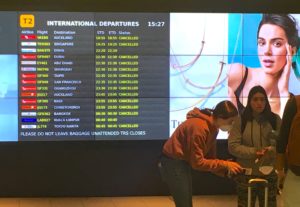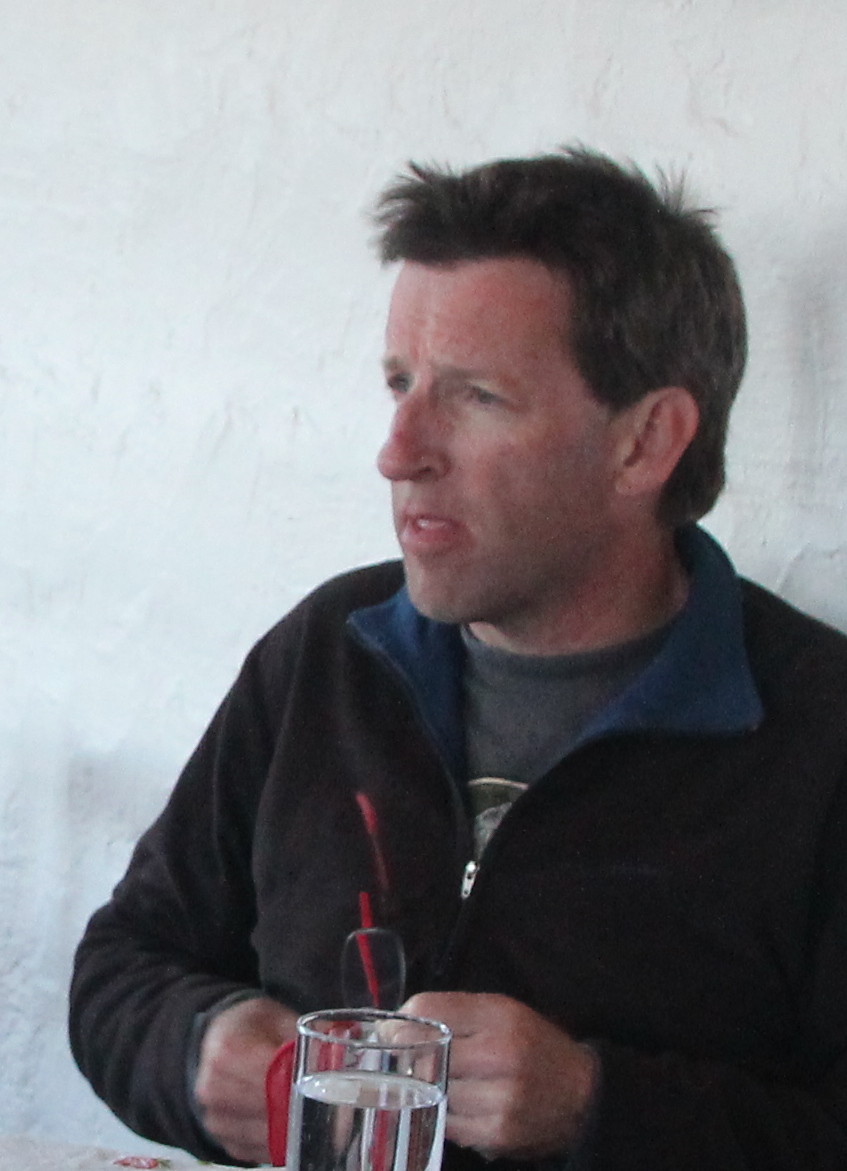 Even though it was almost empty you could all but smell the adrenaline in the international terminal. Tullamarine International Airport, Melbourne, Victoria, Australia, one of the country’s principal travel hubs, a place where in ordinary times the world traffics: businesspeople, backpackers, retired vacationers on the way home, parents with children in tow, massed tour groups speaking multiple languages, checking in to flights to the Emirates, Hong Kong, Singapore, Beijing, Los Angeles, Tokyo, Santiago, Auckland. It was the hub of a web, or at least one among the countless nodes that have made a once-vast world amount to a single interlocking organism, subject to so many of the same joys and griefs.
Even though it was almost empty you could all but smell the adrenaline in the international terminal. Tullamarine International Airport, Melbourne, Victoria, Australia, one of the country’s principal travel hubs, a place where in ordinary times the world traffics: businesspeople, backpackers, retired vacationers on the way home, parents with children in tow, massed tour groups speaking multiple languages, checking in to flights to the Emirates, Hong Kong, Singapore, Beijing, Los Angeles, Tokyo, Santiago, Auckland. It was the hub of a web, or at least one among the countless nodes that have made a once-vast world amount to a single interlocking organism, subject to so many of the same joys and griefs.
When we’d come through weeks earlier, we were cramped and sore and dazed from the 15-hour flight, but still able to feel that exultation of international travel, that incredulity that on one otherwise ordinary evening we were able to walk through a jetway in Los Angeles, buckle ourselves in, taxi through the astonishing multicolored lightshow that is LAX at night—surely one of humankind’s great logistical tours de force—and then hurtle across the entire Pacific in a single night while eating pretty good food and drinking small bottles of Australian wine. In my case the flight mainly entailed watching repeat episodes of Succession to get my mind off the knowledge that our brains were only a couple of feet away from what amounted to a deadly wind of 500 miles per hour at a temperature of 66 degrees below zero, Celsius, according to the helpful seatback information panel that I consulted between episodes. From time to time I remembered a helpful fact from a book I’d read about the transportation of convicts from Britain to Australia, namely that back in the 19th century it was viewed as a great breakthrough when the introduction of sleek clipper ships and better knowledge of wind patterns lowered the transport time from Britain to Melbourne to a mere 15 weeks or so. Not hours.
But that was then, this is now. That seems a lifetime ago, so thorough has been the break between present and past. That was back in January, when friends asked us when we told them of our plans to spend a few months in Australia: “Can you still do that? Isn’t the whole country on fire?”
Well, yes, we could, we responded. The whole country wasn’t on fire any more than all of California was on fire back in October, and anyway we were going to Tasmania—the coolest, wettest part of Australia—and we were going to live in the city, not the bush and just in case we had our smoke masks, N95 certified, because we’d heard that they were hard to find anymore down under.
There’s a lot to tell about all that, but what I want to focus on now is that scene in the airport, when, long before we had hoped to come home from Australia, we found ourselves in the single long check-in line in what seemed an otherwise abandoned international terminal, refugees from our own long-stay working holiday, compelled to come back home because if we didn’t come home in late March it was unclear when we’d be able to come home at all.
The line was for the single flight taking off that afternoon from Melbourne to Honolulu, and after that there wouldn’t be any more such flights for the foreseeable future. And after another day there would be a sharp curtailment of flights between Hawaii and the mainland, too. From the long line of travelers that snaked before the understaffed check-in counter we heard repeated variations of “last flight,” and “getting out at the last possible moment,” and “Sure, I could stay another two months, but it would be a problem if I had to stay longer” and “I just decided it would be better at home.” We could have said all those things too, but mainly we studied our phones and adjusted our masks so that they fit as snugly and comfortably as possible and looked at the clock ticking alarmingly close to takeoff time and listened to the terrible adrenaline-charged dramas at the counter, to the young woman calling her dad and saying “I have to pay a fucking thousand dollars because my luggage is too heavy!” and the grim shouted announcement that, “If you have an Australian passport you will not be allowed to travel. The prime minister just announced that.” We clutched our U.S. passports a bit harder and inched forward. The rumor spread that they were holding the plane until everyone in the line could make it through.
And so after another anxious half hour we made it through the close questioning (“Have you traveled to Europe recently? China? Iran?”) at the check-in desk, the precise weighing of baggage, the security check, another passport check, a jog through what seemed like the world’s largest duty-free shop—which seemed like a sort of monument to a fast-vanishing world of luxury travel—and then another short wait at the gate as the 787 was loaded up with passengers.
There were more stresses to come, to be sure, not least among them the knowledge that the main carriers of coronavirus in the early days of the pandemic were people just like us, international travelers who so effortlessly hopped oceans and national borders, and that we were cooped up with a few hundred of them in a narrow metal tube for the next dozen hours; and would be in close proximity to many more in two more airports and for another six-hour flight from Hawaii to Phoenix, with all those people just as worried about us as we were about them; and then we’d have to navigate driving home and beginning the process of settling into Flagstaff again while quarantining ourselves for two weeks, hoping that we hadn’t picked up the bug somewhere along the way. But for now, as we pushed back and taxied to the runway and then once again were pressed back into our seats by the familiar force of takeoff, we felt relief. We were going home at the same time that we, and much of the world, were developing a whole new appreciation of what home means. Of what living in one place means.
The plane took off into low clouds, so our last glimpse of Australia was not of charred bush forest or pearly beaches or rangelands freshly green with the new rains of autumn: no, it was of parts of the world’s airplane fleet, giant double-decker A380s and smaller planes, parked at a distance from the terminals, prepared for a long wait.
As the view disappeared behind wispy clouds I had the unsettling feeling that they’d be there for a long time.

